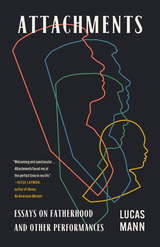9 start with L start with L
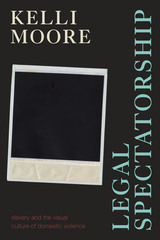
Duke University Press Scholars of Color First Book Award recipient
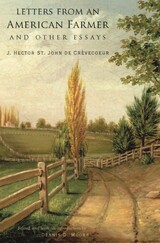
Letters from an American Farmer was published in London in 1782, just as the idea of an “American” was becoming a reality. Those epistolary essays introduced the European public to America’s landscape and customs and have since served as the iconic description of a then-new people. Dennis D. Moore’s convenient, up-to-date reader’s edition situates those twelve pieces from the 1782 Letters in the context of thirteen other essays representative of Crèvecoeur’s writings in English.
The “American Farmer” of the title is Crèvecoeur’s fictional persona Farmer James, a bumpkin from rural Pennsylvania. In his Introduction to this edition, Moore places this self-effacing pose in perspective and charts Crèvecoeur’s enterprising approach to self-promotion, which involved repackaging and adapting his writings for French and English audiences.
Born in Normandy, Crèvecoeur came to New York in the 1750s by way of England and then Canada, traveled throughout the colonies as a surveyor and trader, and was naturalized in 1765. The pieces he included in the 1782 Letters map a shift from hopefulness to disillusionment: its opening selections offer America as a utopian haven from European restrictions on personal liberty and material advancement but give way to portrayals of a land plagued by the horrors of slavery, the threat of Indian raids, and revolutionary unrest. This new edition opens up a broader perspective on this artful, ambitious writer and cosmopolitan thinker who coined America’s most enduring metaphor: a place where “individuals of all nations are melted into a new race of men.”
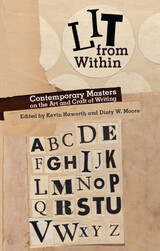
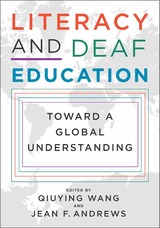
Literacy and Deaf Education: Toward a Global Understanding is organized by region and country, with the first part discussing writing systems that use alphabetic scripts, and the second part focusing on countries that use non-alphabetic scripts. Some examples of the wide spectrum of topics covered include communication methodologies, curriculum, bilingual education, reading interventions, script diversity, and sociocultural development, including Deaf cultural developments. The contributors provide the results from literacy projects in fifteen countries and regions.
This volume aims to widen the knowledge base, familiarize others in the field with these initiatives, and improve global understandings and outcomes of literacy teaching and learning in deaf education from birth to high school.
Signed chapter summaries are available on the Gallaudet University Press YouTube channel.


“A remarkable book capable of reshaping what one takes philosophy to be.”
—Cora Diamond, Kenan Professor of Philosophy Emerita, University of Virginia
Could there be a logical alien—a being whose ways of talking, inferring, and contradicting exhibit an entirely different logical shape than ours, yet who nonetheless is thinking? Could someone, contrary to the most basic rules of logic, think that two contradictory statements are both true at the same time? Such questions may seem outlandish, but they serve to highlight a fundamental philosophical question: is our logical form of thought merely one among many, or must it be the form of thought as such?
From Descartes and Kant to Frege and Wittgenstein, philosophers have wrestled with variants of this question, and with a range of competing answers. A seminal 1991 paper, James Conant’s “The Search for Logically Alien Thought,” placed that question at the forefront of contemporary philosophical inquiry. The Logical Alien, edited by Sofia Miguens, gathers Conant’s original article with reflections on it by eight distinguished philosophers—Jocelyn Benoist, Matthew Boyle, Martin Gustafsson, Arata Hamawaki, Adrian Moore, Barry Stroud, Peter Sullivan, and Charles Travis. Conant follows with a wide-ranging response that places the philosophical discussion in historical context, critiques his original paper, addresses the exegetical and systematic issues raised by others, and presents an alternative account.
The Logical Alien challenges contemporary conceptions of how logical and philosophical form must each relate to their content. This monumental volume offers the possibility of a new direction in philosophy.
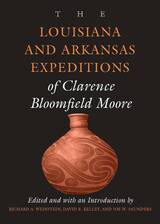
A Dan Josselyn Memorial Publication
The ninth and final volume in the C.B. Moore reprint series that covers archaeological discoveries along North American Waterways.
Clarence B. Moore (1852-1936), a wealthy Philadelphia socialite, paper company heir, and photographer, made the archaeology of the Southeast his passion. Beginning in the 1870s, Moore systematically explored prehistoric sites along the major waterways of the region, from the Ohio River south to Florida and as far west as Texas, publishing his findings, at his own expense, with the Academy of Natural Sciences of Philadelphia.
This volume, the final in a series of nine, includes Moore’s investigations along waterways of Arkansas and Louisiana—the Ouachita, Red, Saline, Black, Tensas, and Atchafalaya Rivers—in three complete field sessions ending in 1909, 1912, and 1913. He located and mapped more than 185 mounds and cemeteries. Artifacts recovered in this territory, such as ceramic effigy pots, earthenware pipes, arrowheads, celts, and projectile points, include some of the most important ones discovered by Moore in his 47 years of excavating. Included in this volume is a CD containing the 69 color illustrations from all the original expedition volumes.
The elaborate earthwork of Poverty Point, located in West Carroll Parish, Louisiana, is perhaps the most remarkable archaeological site presented in the volume. In some cases, Moore documented sites along the tributaries that have since been destroyed by river action or looters. In other cases, the National Register of Historic Sites and concerned landowners in Arkansas and Louisiana have preserved the record of aboriginal peoples and their life ways that was first illuminated by Moore's sophisticated study.
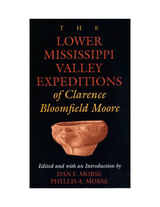
A Dan Josselyn Memorial Publication
C. B. Moore's investigations of the Lower Mississippi Valley are here collected in a one-volume facsimile edition.
Like many other natural scientists from the Victorian era, Clarence Bloomfield Moore (1852-1917) lived several lives—adventurer, paper company executive, archaeologist; however, Moore is chiefly remembered for the twenty-five years he spent investigating and documenting archaeological sites along every navigable waterway in the southeastern United States.
Moore's surveys were and are impressive, and he earned lasting respect from archaeological researchers in the South by publishing, mostly at his own expense, all of the data he recovered. This volume includes works that describe data from Moore's expeditions that were key to the early recognition and preservation of major archaeological sites—Toltec, Parkin, Mound City, and Wicklife, among them—in the lower Mississippi River Valley. This and companion volumes stand today as the defining database for every area in which he worked.

Lucy Stone was a Massachusetts newspaper editor, abolitionist, and charismatic orator for the women's rights movement in the last half of the nineteenth century. She was deeply involved in almost every reform issue of her time. Charles Sumner, Frederick Douglass, William Lloyd Garrison, Julia Ward Howe, Horace Greeley, and Louisa May Alcott counted themselves among her friends. Through her public speaking and her newspaper, the Woman's Journal, Stone became the most widely admired woman's rights spokeswoman of her era. In the nineteenth century, Lucy Stone was a household name.
Kerr begins with Stone's early roots in a poor family in western Massachusetts. She eventually graduated from Oberlin College and then became a full-time public speaker for an anti-slavery society and for women's rights. Despite Stone's strident anti-marriage ideology, she eventually wed Henry Brown Blackwell, and had her first child at the age of thirty-nine.
Although Kerr tells us about Stone's public accomplishments, she emphasizes Stone's personal struggle for autonomy. "Lucy Stone (Only)" was Stone's trademark signature following her marriage. Her refusal to surrender her birth name was one example of her determination to retain her individuality in an era where a woman's right to a separate identity ended with marriage.
Of equal importance is Kerr's discussion of Stone's relationship with Susan B. Anthony and Elizabeth Cady Stanton, as well as her revisionist treatment of the schism which eventually divided Stone from Stanton and Anthony. Stone urged legislators not to ignore the need for women's suffrage as they rushed to enfranchise black males. Stanton and Anthony dwelt only on the need for women's suffrage, at the expense of black suffrage. Women's historians, the general reader, and historians of the family will appreciate the story of Stone's attempt to balance the conflicting demands of career and family.
READERS
Browse our collection.
PUBLISHERS
See BiblioVault's publisher services.
STUDENT SERVICES
Files for college accessibility offices.
UChicago Accessibility Resources
home | accessibility | search | about | contact us
BiblioVault ® 2001 - 2024
The University of Chicago Press



